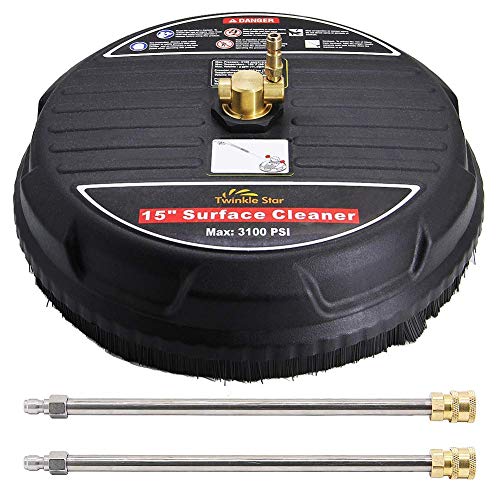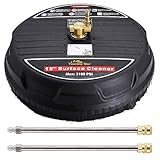Blog
Do I Need To Sand My Deck After Pressure Washing

Pressure washing is a popular method for cleaning decks and removing built-up dirt, grime, and algae. It can leave your deck looking fresh and ready for summer, but many homeowners wonder if sanding is necessary after pressure washing.
The answer to this question depends on the condition of your deck. If your deck is relatively new and in good condition, pressure washing alone may be sufficient to restore its appearance. The high-pressure water can remove surface dirt and stains, leaving behind a clean surface.
However, if your deck is older or has been neglected for a long time, pressure washing may not be enough. Over time, the wood may have become weathered, rough, or splintered. In these cases, sanding may be necessary to smooth out the surface and prepare it for staining or sealing.
Sanding your deck after pressure washing can also help remove any remaining stubborn stains or discoloration. The abrasive action of sanding can remove deeper stains that the pressure washer couldn’t reach, resulting in a more uniform and attractive finish.
It’s important to note that sanding a deck can be a labor-intensive task, especially if you’re doing it by hand. However, if your deck is in poor condition, sanding can make a significant difference in its appearance and prolong its lifespan. Be sure to use appropriate sandpaper and follow the manufacturer’s instructions for best results.
In conclusion, while pressure washing alone can be effective in cleaning and rejuvenating a deck, sanding may be necessary in certain situations. Assess the condition of your deck and determine if sanding is required to achieve the desired results. Remember to take the necessary safety precautions and seek professional help if needed.
The Importance of Sanding Your Deck after Pressure Washing
Pressure washing is an effective method for cleaning and reviving the appearance of your deck. It helps to remove dirt, grime, mold, and stains, leaving your deck looking fresh and rejuvenated. However, pressure washing can also cause the wood fibers in your deck to become raised and rough, which is why it is important to sand your deck after pressure washing.
1. Smooth Surface
Sanding your deck after pressure washing helps to create a smooth surface for staining or sealing. The high-pressure water can cause the wood fibers to splinter or lift, resulting in an uneven surface. By sanding the deck, you can level out any imperfections and ensure that the wood is smooth and ready for the next step.
2. Enhanced Absorption
Sanding your deck not only creates a smooth surface, but it also helps to enhance the absorption of stains or sealants. When the wood fibers are raised or rough due to pressure washing, they can prevent the stain or sealant from penetrating deeply. By sanding the deck, you open up the pores of the wood, allowing for better absorption and longer-lasting protection.
3. Improved Appearance
In addition to creating a smooth surface and improving absorption, sanding your deck after pressure washing also helps to improve its overall appearance. By smoothing out rough spots and removing any remaining dirt or stains, the deck will look cleaner and more aesthetically pleasing. Sanding can also help to restore the natural beauty of the wood, giving your deck a fresh and polished look.
Overall, sanding your deck after pressure washing is an essential step in the deck restoration process. It ensures a smooth surface, enhances absorption of stains or sealants, and improves the overall appearance of your deck. So, don’t forget to grab your sander and give your deck the finishing touch it deserves after pressure washing!
Benefits of Sanding Your Deck
Sanding your deck after pressure washing can provide several benefits for the overall appearance and longevity of your deck.
1. Smoother surface: Sanding your deck can help to create a smoother surface by removing any rough areas or splintered wood. This not only improves the aesthetic appeal of your deck but also makes it safer to walk on.
2. Enhanced stain penetration: Sanding your deck before applying stain allows the stain to penetrate the wood more effectively. This results in a more even and long-lasting finish. It also helps to remove any remaining dirt or debris that may have been missed during pressure washing.
3. Improved adhesion: Sanding rough areas on your deck can improve the adhesion of paint or stain, helping it to adhere more effectively to the wood surface. This can prevent peeling or chipping of the finish over time.
4. Reduced risk of mold and mildew: Sanding your deck can help to remove any mold or mildew that may be present on the surface. By removing these potential sources of moisture, you can reduce the risk of mold and mildew growth in the future.
5. Increased longevity: By sanding your deck and creating a smoother, well-prepared surface, you can help to extend the lifespan of your deck. Removing rough areas and ensuring proper stain or paint adhesion can help to protect the wood from the elements and prevent premature rot or decay.
 |
 |
| A sanded deck provides a smooth surface | A smooth deck enhances the overall appearance |
How to Sand Your Deck after Pressure Washing
Once you have finished pressure washing your deck, it is important to follow up with sanding to achieve optimal results. Sanding helps to smooth out any rough spots or uneven areas, and prepares the surface for staining or sealing. Here are the steps to sand your deck after pressure washing:
- Wait for the deck to dry completely: Before you begin sanding, it is essential to ensure that the deck is completely dry. This may take a few days, depending on the weather conditions.
- Choose the right sandpaper grit: The type of sandpaper you use will depend on the condition of your deck. If there are only a few rough spots, a medium-grit sandpaper (around 80-120) should be sufficient. However, if your deck has significant damage or peeling paint, you may need to start with a coarse-grit sandpaper (around 40-60) and progress to a finer grit (around 150-180) for a smoother finish.
- Start sanding: Begin sanding the deck using a handheld orbital sander or a sanding block. Be sure to work in the direction of the wood grain to avoid leaving marks. Apply even pressure and make multiple passes to ensure all areas are sanded evenly.
- Pay attention to problem areas: During the sanding process, pay extra attention to areas that may need more work, such as cracked boards or rough edges. Sand these areas thoroughly to ensure a seamless finish.
- Clean up the debris: After sanding, use a broom or a vacuum to remove all the dust and debris from the deck. This will help ensure a clean surface for staining or sealing.
- Consider a final hand sanding: In some cases, a final hand sanding may be necessary to achieve a smooth and even surface. Use a sanding block and fine-grit sandpaper to address any remaining rough spots or imperfections.
- Prep for staining or sealing: Once the deck is sanded and cleaned, you can proceed with staining or sealing. Follow the instructions on the staining or sealing product for the best results.
By following these steps, you can ensure that your deck is properly sanded after pressure washing, resulting in a clean, smooth, and ready-to-be-finished surface. Remember to take your time and pay attention to detail for the best outcome.
Questions and answers
Should I sand my deck after pressure washing?
Sanding your deck after pressure washing is not always necessary, but it can help to achieve a smoother and more even finish. It will also remove any remaining loose or flaking paint or stain. If your deck has a smooth surface and there are no visible imperfections, you may not need to sand it.
What are the benefits of sanding my deck after pressure washing?
Sanding your deck after pressure washing can help to remove any rough spots or splinters, making the surface safer and more comfortable to walk on. It will also help to open up the wood pores, allowing for better absorption of paint or stain. Sanding can also help to smooth out any imperfections or uneven areas of the deck.
When is it necessary to sand my deck after pressure washing?
Sanding your deck after pressure washing may be necessary if the surface is rough, has splinters, or if there are any visible imperfections. If your deck has a previous layer of paint or stain that is peeling or flaking, sanding can help to remove it and create a smooth surface for refinishing. Additionally, if you plan to apply a new layer of paint or stain, sanding will provide better adhesion.
Can I skip sanding my deck after pressure washing?
While sanding your deck after pressure washing is recommended for the best results, it is possible to skip this step, especially if your deck is already in good condition. However, skipping sanding may result in a slightly rougher finish and less adhesion for new paint or stain. If you decide to skip sanding, make sure to thoroughly clean and dry the deck before applying any new finish.
How should I sand my deck after pressure washing?
After pressure washing your deck, you can sand it using a handheld orbital sander or a sanding block. Start with a coarse-grit sandpaper to remove any rough spots or imperfections, and then switch to a finer-grit sandpaper for a smoother finish. Make sure to sand in the direction of the wood grain to avoid scratching the surface. After sanding, clean the deck to remove any dust before applying a new finish.
Recent Posts
-
How To Connect Soap To Honda Pressure Washer
June 28, 2024 -
A To Z Pressure Washing Scam
June 27, 2024 -
How To Pressure Wash Your Home With A Garden Hose
June 27, 2024 -
Where Can I Buy Honda Pressure Washer Parts
June 25, 2024














